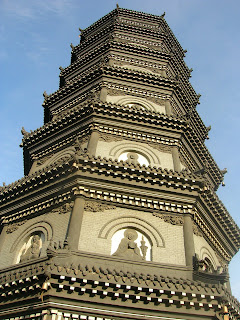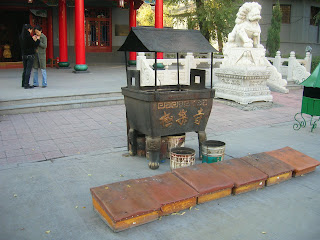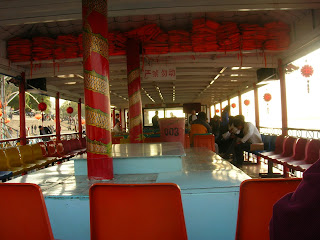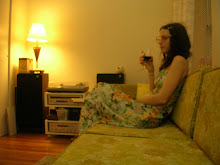
We took the train to Haerbin early tuesday morning. In a country with so many people, it is difficult to get train tickets during the two main holidays in China--National day when schools close for a week, and Spring Festival when schools close for a month. Many people go to visit their families at this time and the trains book up quickly. Also the regulations of when the tickets go on sale seem to be constantly changing. But we were lucky and got 3 tickets (aaron's friend rebecca is traveling around asia and stayed with us for a week) in the sleeper cars. The journey was peaceful; it was still dark out as our train slid out of the station and we were rocked gently by the motion of the train in our top bunks. We slept and read the afternoon away, ate instant noodles along with everyone else as the afternoon wore on, and watched the landscape roll by out the window, flat and featureless, dotted by ocasional communes--large communities surrounded by brick walls and endless fields. The farther north we went the trees began to change and the low-hanging willow trees gave way to pines. It was beginning to get dark again when we finally pulled into the station, but the 11 hour journey had seemed surprisingly fast. There was a certain excitement and charge in the air as we stepped off our old green train into the noisy crowds. The air was noticeably colder, and full of the smells of autumn which are particular to china. I liked Haerbin almost immediately as we exited the station which is right in the middle of the city. We found a hotel easily--an old place that seemed like it was once quite nice but had grown shabby over the years. The whole place felt somewhat musty and 1950's. I liked the wallpaper and the old-fashioned bedspreads and lamps.
We spent a lot of our time in the city walking. Unlike Beijing, Haerbin's streets are not set up in a grid and the smaller size of the city makes it more accessible. We wandered, got lost, wandered more, enjoying the autumn weather and little details unique to this city. A lot of chinese restaurants have red lanterns hanging in front outside, but in Haerbin they have significance: the more red lanterns the more expensive the restaurant, blue lanterns indicate a muslim restaurant, and korean flag lanterns mark a korean restaurant.
the view from our second hotel room
The area where we stayed was lively and full of markets and squares and people outside. We moved to another hotel the next two nights which was a little cheaper and on a hill next to a square in a busy neighborhood. When we wandered by the square the first evening loud music was playing from loud speakers and people danced ballroom dances around the square. Both mornings we were awoken (at about 5:30) by people playing the trumpet and trombone in the square. One person, unfortunately for us, seemed to be just learning to play, but the second morning i think someone else was playing becuase it sounded much better. i lied in bed listening to the full sound of the instruments playing what sounded like Russian ballads. During the day kids roller skated, old men gathered with their birds in wooden bird cages to sit and chat, one man played the er hu... it was always busy and full of people.
One day we took a long walk over a long bridge over the train yard. I'm so attracted to cities like Haerbin--chilly, industrial, easy to walk around and explore. We walked up a strange set of cement spiral stairs under a bridge and found ourselves high up over that part of the city with the train tracks below. Eventually that led us to another main section of town with a long pedestrian street--the oldest in Haerbin, with a lot of Russian architecture and the most famous of the Russian churches in the city, saint Sophia.
saint Sophia
While Haerbin felt much smaller and easier to explore by foot than Beijing, it still isn't exactly a small city; the population is around 5 or 6 million. But the streets are actually crossable on foot, unlike in Beijing where you're constantly having to walk far out of your way to get to a pedestrian bridge just to get across a road.
 one of the several Russian orthodox churches in Haerbin. An old man exercises outside.
one of the several Russian orthodox churches in Haerbin. An old man exercises outside.
We took a dragon boat across the wide river that flows along the city. It was a touristy area (chinese tourists) on the other side, though we weren't completely sure what the draw was... though you could rent crazy bikes built for two or three and ride around the shady lanes past a lot of russian-esque buildings.... which aaron insisted on doing. so we did, and it was pretty comical riding around on this bike that felt like it was going to break in half at any moment. we took turns in the different seats. aaron and rebecca managed to steer us safely past the other bikers, pedestrians, and occasional cars, but when it came my turn i could not get us going straight and continually almost crashed us. then i started to laugh so hard i was crying, and gratefully resumed my seat in the middle.
the river boat dock at night


crazy kids' toys

 truck full of tiny red and yellow tomatoes
truck full of tiny red and yellow tomatoes
ok, this is a photo of a picture. --another of the russian churches of Haerbin

busy pedestrian street at night

one of the many streets under construction
During our time in the city we saw only a small handful of other foreigners probably all or most of whom were Russian. The rarity of foreigners there was apparent by the way people would stare at us. Being in Beijing, I'd forgotten how it felt to be stared at everywhere you go (like the last time we were in China, in Xi'an). People were friendly though--they are just curious and occasionally excited to talk to you, or to take their picture with you. We would overhear people talking about us guessing what country we were from--most people assumed Russia because of its proximity and most of the foreigners in Haerbin are Russian.

an antique shop full of old russian camaras. a lot of shops sold binoculars, swords, furs, and nesting dolls. We found some Russian restaurants too, and though I've been enjoying Chinese food a lot, the hearty soup, bread, and potatoes were a welcome change.
 nothing better than a stuffed-deer-greeter
nothing better than a stuffed-deer-greeter
Probably because Haerbin is so cold in the winter, many of the shopping areas and markets are underground. We continually saw stairs leading down from the sidewalk and would discover endless hallways of subterainian shopping. This picture hardly captures the vastness of it all, but i guess it gives some idea.
 although you can get a driver to take you straight to the wall for a pretty reasonable price, we opted to go by public transportation. it's more challenging and fun to do it independently, plus the whole round trip cost about $4. this is a public mini bus we took the last leg of the trip. a woman got on with a red plastic bag that i noticed was moving at her feet. awhile later it somehow came undone and a large catfish flapped onto the floor of the bus. for the next few minutes she and a helpful fellow passenger tried to catch it, but by the time they finally did the second fish had escaped.
although you can get a driver to take you straight to the wall for a pretty reasonable price, we opted to go by public transportation. it's more challenging and fun to do it independently, plus the whole round trip cost about $4. this is a public mini bus we took the last leg of the trip. a woman got on with a red plastic bag that i noticed was moving at her feet. awhile later it somehow came undone and a large catfish flapped onto the floor of the bus. for the next few minutes she and a helpful fellow passenger tried to catch it, but by the time they finally did the second fish had escaped. 








































































